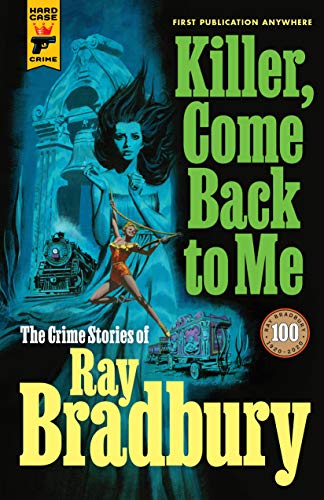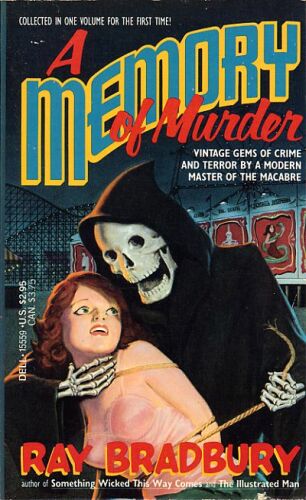 Ray Bradbury (1920-2012) had one of the highest public profiles for a science fiction writer. He used to be on The Tonight Show now and then and had his own T.V. show (Ray Bradbury Theater). When the space shuttle blew up in 1986, I saw him on Nightline. I read The Martian Chronicles in 11th grade of high school as part of English class. Fahrenheit 451 was another favorite English class reading title.
Ray Bradbury (1920-2012) had one of the highest public profiles for a science fiction writer. He used to be on The Tonight Show now and then and had his own T.V. show (Ray Bradbury Theater). When the space shuttle blew up in 1986, I saw him on Nightline. I read The Martian Chronicles in 11th grade of high school as part of English class. Fahrenheit 451 was another favorite English class reading title.
My favorite Bradbury are his stories until around 1950 when he started appearing in mainstream magazines such as Collier’s and The Saturday Evening Post. He then went full pathological ice cream nostalgia.
Damon Knight wrote:
“Childhood is Bradbury’s one subject, but you will not find real childhood here, Bradbury’s least of all. What he has had to say about it has been expressed obliquely, in symbol and allusion, and always with the tension of the outsider– the ex-child, the lonely one. In giving up this tension, in diving with arms spread into the glutinous pool of sentimentality that has always been waiting for him, Bradbury has renounced the one thing that made him worth reading.”
Before sentiment overwhelmed Ray Bradbury, he wrote some rather nasty stories. My favorite by him were in Weird Tales. Some can be found in The October Country and those were also rewritten. I found a used paperback around 35 years ago, Bloch and Bradbury. I was eager to read those early Robert Bloch stories in H. P. Lovecraft mode. What I was not expecting is how much I liked the Bradbury stories, “The Handler,” “The Dead Man,” “Fever Dream,” and “The Watchers.”
What may surprise some is Bradbury was writing for the detective/crime story pulp magazines in the 1940s. Dell published fifteen stories in the paperback A Memory of Murder in 1984. Hard Case Crime collected crime stories from 1944 to 2009. Here are the contents:
Introduction (Killer, Come Back to Me) • essay by Jonathan R. Eller
A Touch of Petulance Dark Forces, 1980
The Screaming Woman Today, May 27, 1951
The Trunk Lady Detective Tales, September 1944
“I’m Not So Dumb!” Detective Tales, February 1945
Killer, Come Back to Me! Detective Tales, July 1944
Dead Men Rise Up Never Dime Mystery, May 1945
Where Everything Ends Where Everything Ends, 2010
Corpse Carnival Dime Mystery, July 1945
And So Died Riabouchinska The Saint Detective Magazine, June-July 1953
Yesterday I Lived! Flynn’s Detective Fiction, August 1944
The Town Where No One Got Off Ellery Queen’s Mystery Magazine, October 1958
The Whole Town’s Sleeping McCall’s Magazine, September 1950
At Midnight, in the Month of June Ellery Queen’s Mystery Magazine, June 1954
The Smiling People Weird Tales, May 1946
The Fruit at the Bottom of the Bowl Detective Book Magazine, Winter 1948
The Small Assassin Dime Mystery, November 1946
Marionettes, Inc. Startling Stories, March 1949
Punishment Without Crime Other Worlds Science Stories, March 1950
Some Live Like Lazarus Playboy, December 1960
The Utterly Perfect Murder Playboy, August 1971
Hammett? Chandler? Not to Worry! (essay) by Ray Bradbury 1984
I thought this was going to be A Memory of Murder with more stories. There are differences.
The following stories were left out of Killer, Come Back to Me:
A Careful Man Dies New Detective, November 1946
It Burns Me Up! Dime Mystery, November 1944
Half-Pint Homicide Detective Tales, November 1944
Four-Way Funeral Detective Tales, December 1944
The Long Night New Detective, July 1944
Hell’s Half Hour New Detective, March 1945
The Long Way Home Dime Mystery, November 1945
Wake for the Living (The Coffin) Dark Carnival (1947)
The Candy Skull Dime Mystery, January 1948
There is substantial difference in contents between the two collections. As Bradbury wrote, Dashiell Hammett and Raymond Chandler had nothing to fear from him. These crime stories from the 1940s do show a different direction that Bradbury could have gone. “The Whole Town’s Sleeping” and “At Midnight, at the Month of June” are connected and feature a serial killer. “The Fruit at the Bottom of the Bowel” has a crazed murderer. Bradbury could have written something like Psycho in a different time-line. “Corpse Carnival” is memorable for a Siamese twin looks for his brother’s killer. That is the sort of story Fredric Brown could have written.
Several of the stories have what I call the vague Bradbury ending where the ending is left to the reader to imagine. This is not top-shelf Bradbury but it is interesting Bradbury if you are familiar with his other fiction.

Please give us your valuable comment